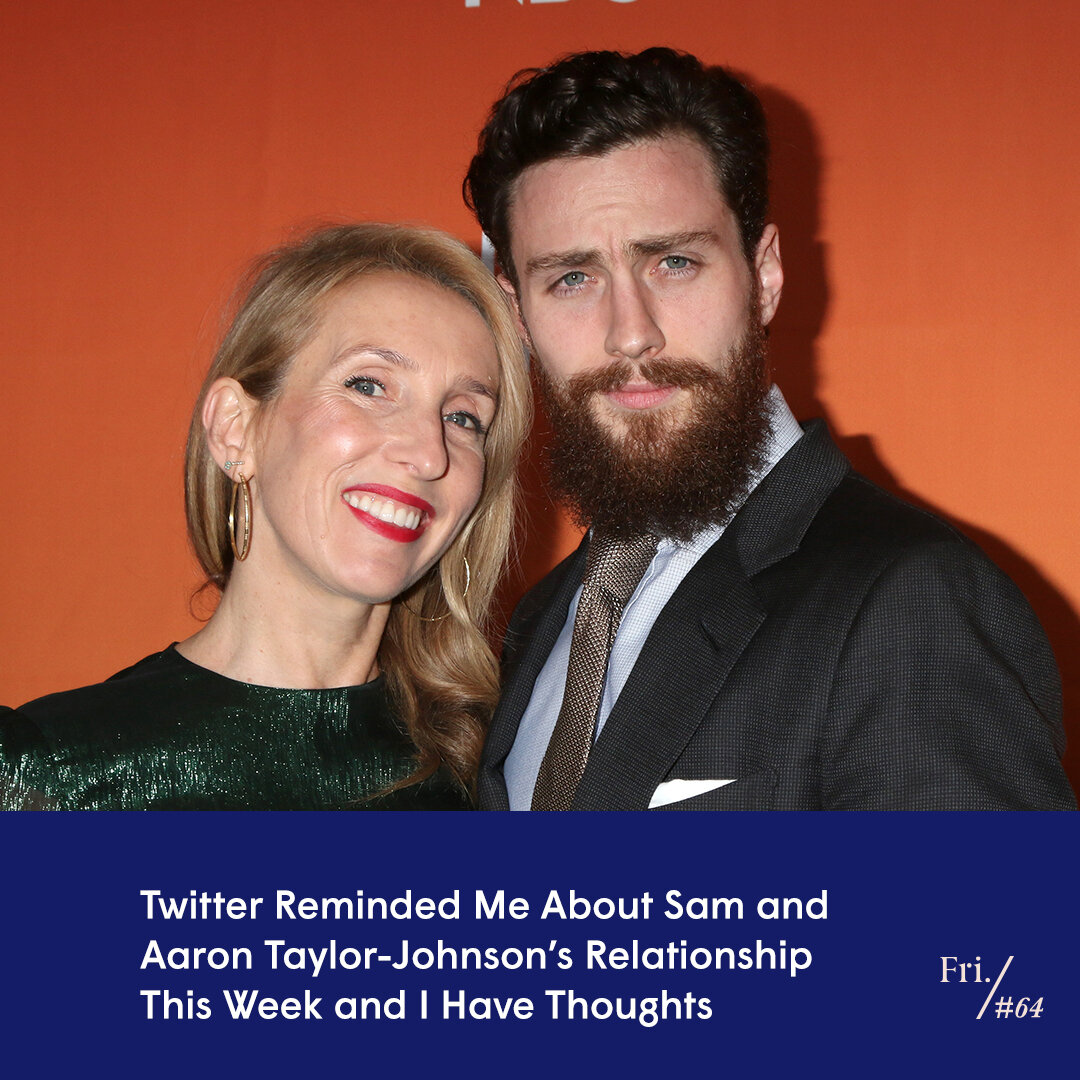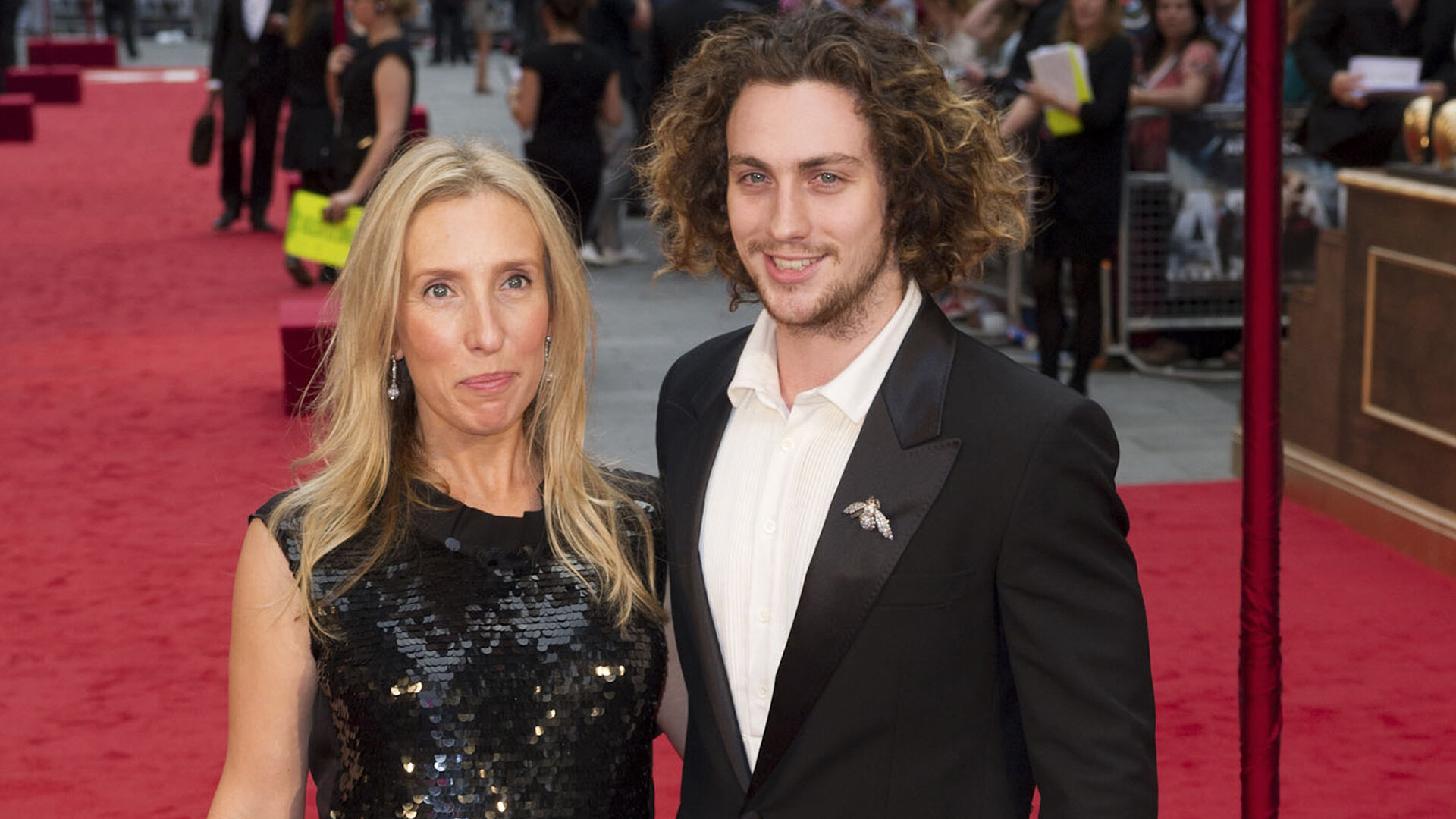It’s Not Sexist to Point Out That A Powerful Woman Might Have Groomed A Teen Boy, FYI
By Stacy Lee Kong
Image: Shutterstock
In 2010, Elle magazine published a fawning profile of Sam Taylor-Johnson, the British art darling-turned-filmmaker who was at the time promoting Nowhere Boy, a drama about John Lennon’s childhood. And let me tell you, re-reading it in 2021 is a trip.
Writer Rachael Combe set up the story by saying she was meeting Taylor-Johnson in the South of France, where the director was vacationing “with her fiancé, actor Aaron Johnson—who happens to be 20 to Taylor-Wood's 43 and the star of her feature film directorial debut, Nowhere Boy—their six-week-old daughter, and her children from her previous marriage.” (At the time of the interview, she was still going by her original last name, Taylor-Wood, but after they married in 2012, they both took the last name Taylor-Johnson.)
The story goes on for several thousands more words, but I kept coming back to that framing: “who happens to be 20.” It’s glib, even dismissive—and totally characteristic of the way women’s magazines have covered this relationship over the years.
Okay, so… who are these people?
The whole reason I found this story—and a bunch of others published between 2010 and 2019—was because Aaron, who’s now 30 and perhaps better known for his roles in Kick-Ass, Avengers: Age of Ultron, Nocturnal Animals and Tenet rather than his marriage, was trending and I wanted to know why. Turns out, the internet was extremely excited over a (now debunked) rumour that the couple was splitting up, which reminded me that they… um, existed. I mean, I did vaguely remember that they’d gotten together ages ago and that she was a lot older than him, but when I saw tweets referring to Taylor-Johnson as a “groomer granny,” I turned to Google to find out what the hell the internet was talking about. And there was a lot to find.
The couple met in 2008 when Aaron auditioned for Nowhere Boy. (Rumours that Taylor-Johnson was a family friend who’d known him since childhood don’t seem to be true.) There are varying reports of exactly how old he was at the time—according to the Hollywood Reporter he was 18, while other publications say he was 19. Either way, she was in her early 40s, 23 years his senior and recently divorced from British art dealer Jay Jopling, with whom she had two daughters.
She wasn't just older than him, she was also wealthier, better connected—her circle of friends includes Elton John and Damien Hirst—and professionally more established. So: there was both the general power imbalance that was exacerbated by his age and the precise power imbalance of Taylor-Johnson's role as his director. Instead of at least acknowledging that, though, most women's mags just… glossed over it completely.
Reminder: It is never appropriate for adults to pursue teenagers
But they shouldn’t have. Forget the exact number of years between them. He was a teenager, she was an authority figure, and it seems that they began their relationship while working together. In a 2012 interview with the Guardian, Aaron hedged when answering Sean O’Hagan’s question about whether they really had fallen in love on set, saying, "Well, you know, kind of. Maybe. I mean, it must have helped that we already had a brilliant connection as actor and director." But as O’Hagan points out, when the paper’s features writer, Simon Hattenstone, visited the set, this is how he described it: "Whenever the rain comes, she runs inside the house, arm in arm with 19-year-old Aaron Johnson, who plays Lennon. They dance and laugh like teenagers in love. I've never been on a film set with such a strange atmosphere. While the rest of the cast and crew are welcoming, Taylor-Wood and Johnson seem oblivious to the world.”
Sam and Aaron Taylor-Johnson in 2012. (Image: Shutterstock)
As the years have gone by, the couple has admitted that there was something going on during the making of Nowhere Boy, even as they’ve both stressed that Aaron made the first move. Despite being “very professional through the entire film,” according to Taylor-Johnson, “everyone on set knew. And as soon as we finished, he told me he was going to marry me. We had never been on a date, or even kissed.”
Here's the thing, though: teenagers have crushes on adults all the damn time. That doesn’t mean we should take them up on it. In fact, we have a responsibility not to act on their attraction, even if they seem 'mature for their age'—but that’s exactly what Taylor-Johnson did, by her own admission. The fact that he was technically an adult doesn’t make it okay, nor do his feelings about the relationship, which have always been outwardly positive. I’m not trying to undermine Aaron’s agency or infantilize him when I say that. But as I argued when we were talking about Scott Disick’s string of barely-legal girlfriends, young adults can have autonomy, make their own decisions, be super smart and responsible and still end up in relationships with predatory people.
Women’s magazines really pushed the notion that questioning Sam Taylor-Johnson's behaviour was sexist
This week’s trending topic aside, the discrete event we’re talking about—Taylor-Johnson’s decision to embark on a relationship with a teenager—happened a decade ago, and however wrong it was then, they’re still together and, seemingly, thriving. So why think about it now? For the same reasons we should acknowledge that the beginning of Woody Allen’s relationship with Soon-Yi Previn was also predatory—because it’s true. It's also important to look back at how media shaped conversation about this situation in the past, I think. So, maybe the more relevant question this week is not ‘What did Taylor-Johnson do?’ as much as it is, ‘How effectively did women’s media talk about and contextualize her behaviour?’ And the answer to that is: not at all.
Almost every profile, interview or trending news story that I read about the couple—and I've read a lot of them this week—mentions the criticism they’ve received and the mean things people have said them about them, while simultaneously rhapsodizing about their love. In a Harper’s Bazaar profile, their friend James Frey makes the bold claim that “they have one of Hollywood’s great love stories, one that rivals those of Bogie and Bacall, Taylor and Burton, Steve McQueen and Ali MacGraw, but one that is somehow more beautiful because it hasn’t been played out in the public eye.” (The irony of portraying them as uber private in a profile where they discuss their relationship extensively, though…)
However, none of the pieces I saw delved into uneven power dynamics or potential labour issues of the couple's meet cute. In fact, many publications passionately defended Taylor-Johnson against what they described as sexist treatment.
In Combe’s 2010 article: “When a powerful man of a certain age woos a pretty young thing, people roll their eyes and even express censure, but they don't react as though it's diabolical or incomprehensible. But reverse the gender roles and everyone starts squirming. No matter how accomplished a man is, a richer, older, or more successful romantic partner is perceived as emasculating to him. Somehow he is always diminished by her power, yet a woman's reputation is generally burnished by landing a Big Fish. But let's get to the crux of the matter: We still, still, still—even after all that sexual liberation and Internet porn—recoil at an older woman's libido, never mind her body.” (The problem is not her libido!!!!)
In a 2017 Harper’s Bazaar article: “Naturally, a younger man wanting to be a relationship with an older woman is a lot for many to compute, such are society's sexist and outdated parameters of what a happy couple should look like.”
In a 2019 Elle UK article: “At the time, the age gap between the pair caused ludicrous and, let's face it, sexist controversy.”
To be fair, Taylor-Johnson has been the subject of sexism and ageism, especially on Twitter this week. She’s been referred to as a “fossil,” “that old lady,” a “hag” and an “old bitch,” which is definitely not okay. But it’s dishonest to characterize criticism itself as sexist—or believe that women are somehow fundamentally incapable of being predatory.
Journalists have a responsibility to think about the conclusions they’re drawing
It is wild that reputable magazines published stories that not only overlooked the potential for abuse between an adult in a position of authority and a teenager, but also positioned their relationship as a win for feminism. But I probably shouldn’t have been surprised, because it feels very similar to the early 2010s trend among feminists and feminist media to gleefully objectify men. I have zero problems with appreciating hot dudes, but I’d argue that hyper-focusing on Jon Hamm’s penis wasn’t really about aesthetic appreciation as much as it was about giving women permission to behave like men do, as if feminism means the freedom to replicate the systems that have done us so much harm. But when "flipping the script" means mimicking systematic oppression, it doesn't do anything for the cause, and has the added consequence of hurting people.
Combe’s Elle story ends with a line that was definitely meant to resonate with lots of women: “I'm sure every fortysomething working mother of three could benefit from having her partner gush about her like a teenager, like he invented love just for her,” Combe writes, before quoting Aaron on just how much he loves Taylor-Johnson (“I just feel like we're like two souls that have been joined together,” he says. “The only thing I've ever been sure of in my life is when I wanted to be with Sam.”)
The story was published on October 15, 2010, four months after Aaron turned 20. So as it turns out, 'like a teenager' wasn't that far off base.
And Did You Hear About…
Lainey Gossip’s insightful post about South African journalist Margaret Gardiner mistaking Daniel Kaluuya for Leslie Odom Jr. in a post-Oscars interview, and what “doing better” looks like.
Allison P. Davis’ insightful and hilarious post-mortem of Kimye’s relationship.
This essay on The Sopranos, family and COVID.
The word “cheugy.”
Zoe Yang’s excellent essay on why BIPOC solidarity doesn’t start with food. (It was inspired by The God of Cookery, an Instagram account that has racked up more than 31,000 followers by calling out cultural appropriation in food—while the Toronto man behind the account, who’s Chinese, bullies and gaslights biracial people and adoptees, especially if they're women.)
The woman on TikTok who is the telling the story of how she found out her husband was cheating on her via voiceovers on food videos. It’s *riveting*.


